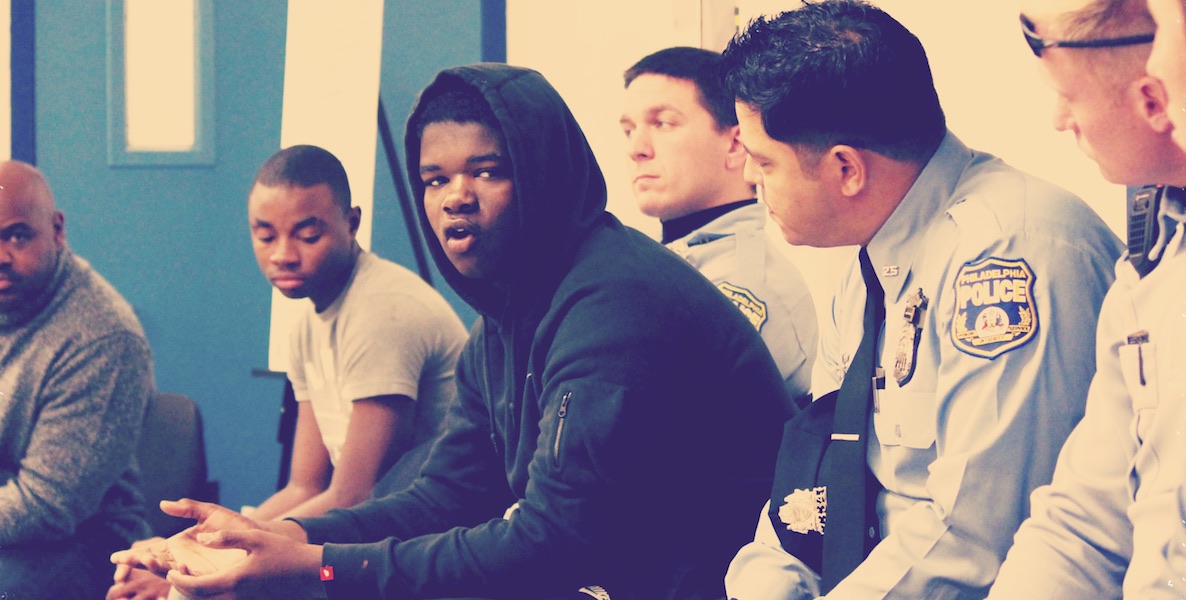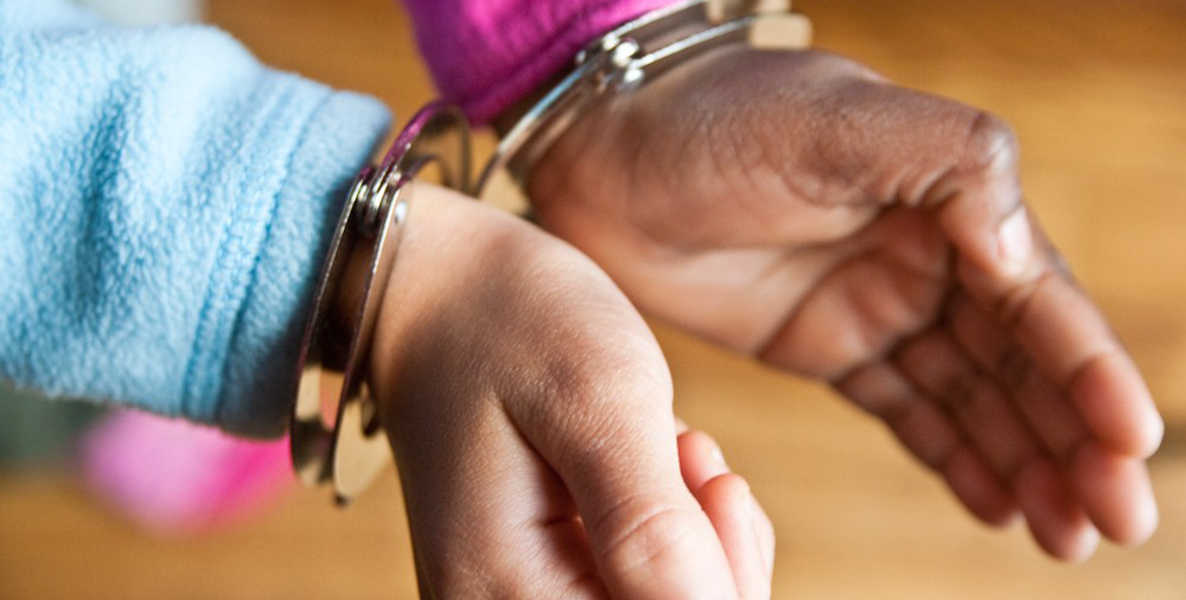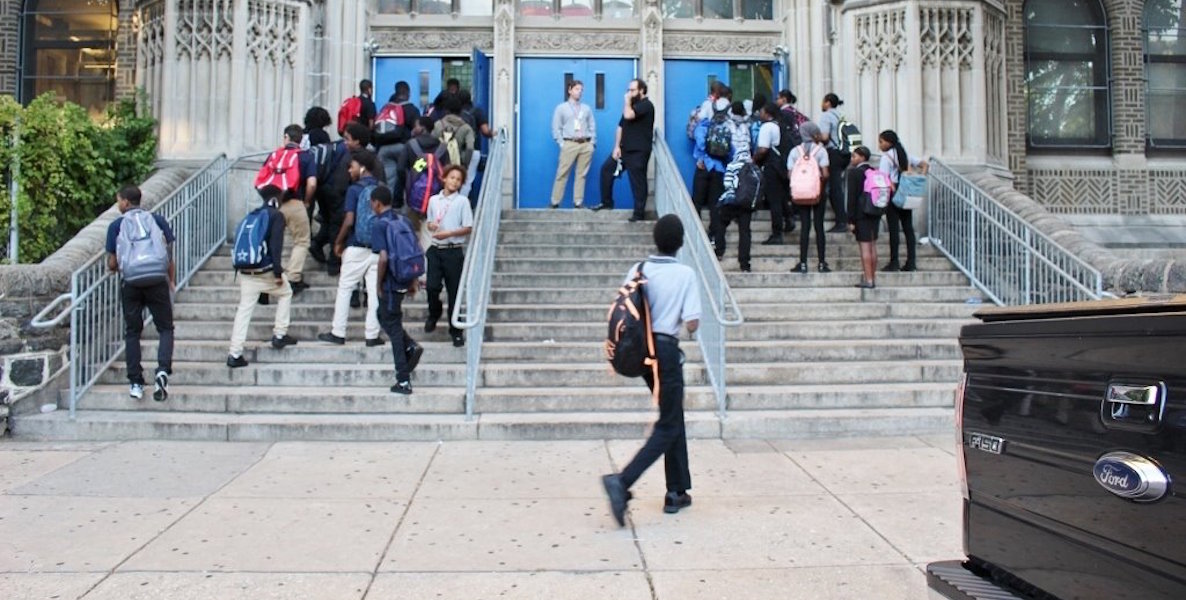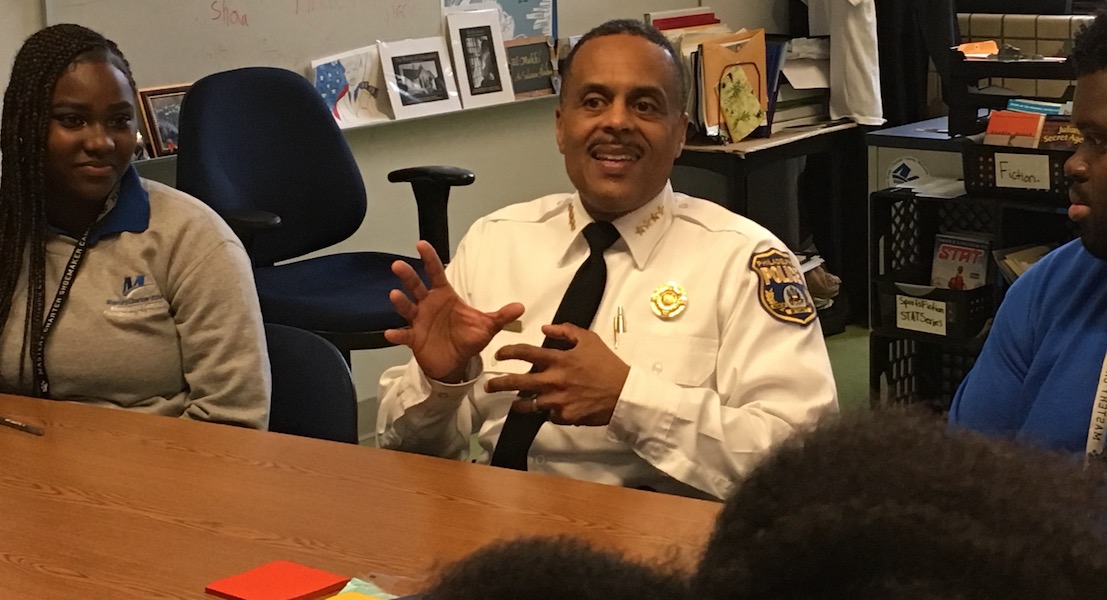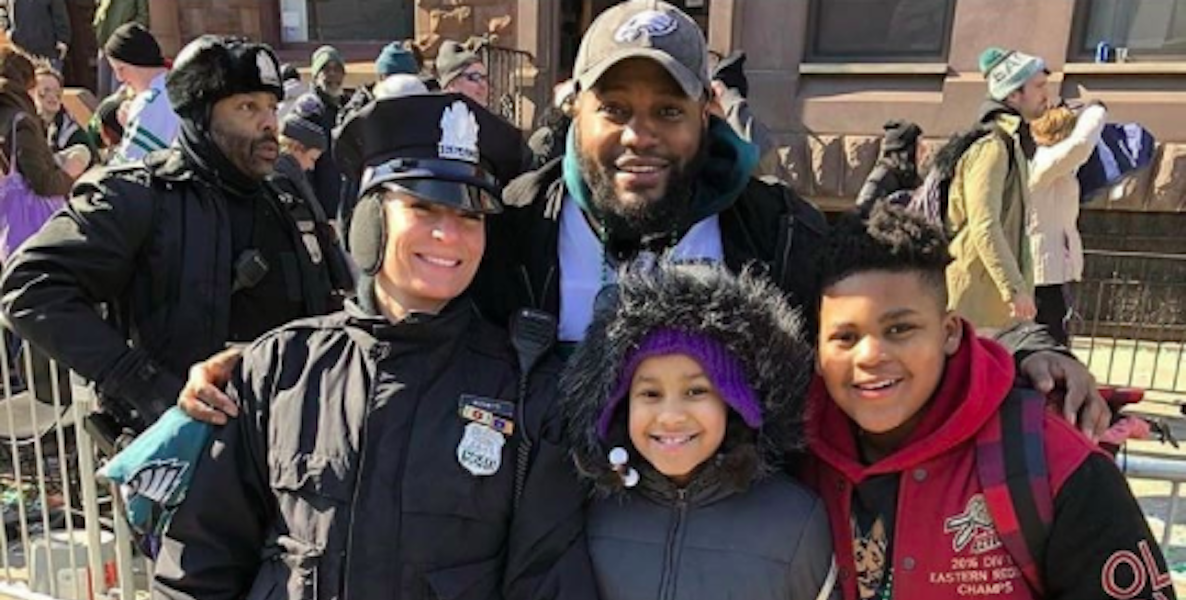Say you were a kid of 11 or 12, arrested late at night for swiping candy from a corner store, with a couple of joints in your pocket. You’d likely end up at a local police precinct, amidst adult offenders and victims, in a holding cell with a handful of other kids—older and perhaps more hardened. There, you might wait for hours while the police processed your case—taking fingerprints, talking to parole, locating your parents, checking with social services, checking for outstanding warrants, waiting for a ride home. Eventually, if you’re a first or second-time offender, you’d likely be sent home. End of story.
![]() Except, of course, that’s not the end of the story. It’s likely that something else—besides just preteen stupidity—is going on at home. Perhaps your mom works the night shift, leaving the kids alone; perhaps you’re self-medicating with the marijuana; perhaps you’re out too late to get up for school in the morning. Perhaps, as is often the case, this small infraction will lead to other larger offenses, to a crime that puts you on the pipeline to prison. As our system is set up right now, those scenarios go undiscovered—as do opportunities to intervene and set kids on the right course.
Except, of course, that’s not the end of the story. It’s likely that something else—besides just preteen stupidity—is going on at home. Perhaps your mom works the night shift, leaving the kids alone; perhaps you’re self-medicating with the marijuana; perhaps you’re out too late to get up for school in the morning. Perhaps, as is often the case, this small infraction will lead to other larger offenses, to a crime that puts you on the pipeline to prison. As our system is set up right now, those scenarios go undiscovered—as do opportunities to intervene and set kids on the right course.
“The way the justice system interacts with families and young people is not to address the ‘why’ of why they’re there,” says Lauren Fine, executive director of the Youth Sentencing and Reentry Project. “Things happen in context. We should, as a system, try to respond in context.”
“This is a way to do smarter policing,” says Lt. Clark. “We know a lot of juvenile offenders become adult offenders. We can reduce the number of offenses, by reducing the number of offenders, by intervening earlier.”
That’s why, spurred by two Philadelphia police officers, the city is aiming to become the first jurisdiction in the country with a Juvenile Justice Hub—a central location just for kids who are brought in by the police. There they would be processed, but also evaluated for their and their family’s social services needs—therapy, housing, out of school programs, rehab—and then set up with a way to access those services. “The goal,” says Lt. Steve Clark, of the department’s strategic planning division, “is fewer kids becoming victims of crime, and fewer kids becoming offenders.”
Philly’s Juvenile Justice Hub last week was named one of 35 finalists in the Bloomberg Philanthropies Mayors Challenge, out of 320 ideas from around the country for “innovative solutions to urgent local issues.” With a $100,000 Bloomberg grant, the city will now launch a six month pilot of the program, and then apply again for up to $5 million to build the hub. (In addition to the grand prize winner, four of the 35 “Champion Cities” will receive $1 million in the fall.) The closest thing to what’s being proposed in Philly is in Miami, where all juveniles arrested are taken to a central location. But that facility does not provide diversion services.
![]() This idea is an extension of a successful—and nationally innovative—school diversion program launched here in 2014 by former Deputy Commissioner Kevin Bethel, which upended the way students are treated for committing nonviolent infractions in school. Now students who are first or sometimes second offenders, instead of being charged, are sent to a pre-arrest diversion program that keeps them in school, evaluates the cause of their disruptive behavior and sets them up with social services. In its first year alone, police cut in half the number of kids arrested in school, and that number has grown since.
This idea is an extension of a successful—and nationally innovative—school diversion program launched here in 2014 by former Deputy Commissioner Kevin Bethel, which upended the way students are treated for committing nonviolent infractions in school. Now students who are first or sometimes second offenders, instead of being charged, are sent to a pre-arrest diversion program that keeps them in school, evaluates the cause of their disruptive behavior and sets them up with social services. In its first year alone, police cut in half the number of kids arrested in school, and that number has grown since.
The proposed Juvenile Justice Hub would take that same concept and apply it to incidents that occur outside of school; the school diversion program would also be housed here. (Bethel has since left the department to work with Drexel University and the Stoneleigh Foundation to help spread the program and change school policing policy.)
Philadelphia is in the midst of a national movement to reform our criminal justice system, something about which youth advocates have been clamoring for years. It’s not just about the raw numbers, though those are striking: About 200,000 Americans under the age of 18 are incarcerated around the country, including about 60,000 teenagers who are in juvenile detention centers. It’s also about which kids most often end up behind bars: According to the Sentencing Project, African American juveniles are 269 percent more likely to be arrested on curfew charges than white juveniles, and 2.5 times more likely to be charged for property crimes than their white counterparts. That has an unsurprising ripple effect: Youth who serve time in detention centers are much less likely to finish high school and much more likely to end up in prison as adults.

In Philadelphia last year, about 2,000 youth were brought in by police for infractions that would send them to the Juvenile Justice Hub. Many were not charged with anything, before being sent home with little or no follow up. It’s those kids who could hopefully be diverted to other services—not just for their sake, but for all of ours. “This is a way to do smarter policing,” Clark says. “We know a lot of juvenile offenders become adult offenders. We can reduce the number of offenses, by reducing the number of offenders, by intervening earlier.”
Clark and his colleague, Sgt. John Ross, started talking internally about a Juvenile Justice Hub as part of work looking into what happens department-wide when kids are arrested; they formed the idea with Rhonda McKitten, a Stoneleigh Fellow who works with the police department on juvenile issues. At the same time, the city’s Office of Criminal Justice has been looking at ways to reduce incarceration and other criminal justice reforms, including of the juvenile system.
The hub was one of 13 ideas the city considered sending to Bloomberg for the competition, according to Chief Grants Officer Ashley Del Bianco. A couple of others, including creating one application for different services offered to citizens, are now being worked on here as well. This is the second time Philly has had success with the Bloomberg Mayors Challenge, which is in its second year in the U.S. In 2013, it was awarded $1 million to launch FastFWD, a problem-solving civic accelerator that targeted startups to find solutions to old issues. The lessons learned from that project have changed the ways in which the city bids out for services.
In Philadelphia last year, about 2,000 youth were brought in by police for infractions that would send them to the Juvenile Justice Hub. Many were not charged with anything, before being sent home with little or no follow up. It’s those kids who could hopefully be diverted—not just for their sake, but for all of ours.
This time around, the 35 finalists are big and small cities, with ideas around environment, economics, opioids, crime and transportation. (Chelsea, Massachusetts, is proposing its own version of a criminal justice hub.) One of the things Bloomberg will consider is how well a solution can translate to problems in other cities.
Clark says the hub is part of a larger police effort to change the way cops interact ![]() with the people they are there to serve—an effort that often seems slow and laboring, but is clearly needed here and across the country. Already, Clark says, the department had been training officers in how the effects of trauma on victims, offenders and witnesses might color their interactions with cops and with each other. This project acknowledges that the effects of urban life can be even more damaging for kids—poverty and its ill effects of transience, hunger, struggling schools, not to mention violence that pervades so many neighborhoods.
with the people they are there to serve—an effort that often seems slow and laboring, but is clearly needed here and across the country. Already, Clark says, the department had been training officers in how the effects of trauma on victims, offenders and witnesses might color their interactions with cops and with each other. This project acknowledges that the effects of urban life can be even more damaging for kids—poverty and its ill effects of transience, hunger, struggling schools, not to mention violence that pervades so many neighborhoods.
“There are kids who are 10 who have seen shootings, violent robberies, fights,” Clark says. “As a child, it hardens you. We need to recognize that.”
To Fine, at Youth Sentencing and Reentry Project, this recognition is a long time coming, and she’s excited—if Philly can pull it off—by the idea of working in a system that approaches juvenile justice holistically. In fact, Fine would push it even further: Yes, it’s important to look at trauma, and the context of poverty and social ills. But it’s also important, she says, to consider a child’s strengths, goals and aspirations—not just to treat them for what is wrong, but also to help them become the adults we all want them to be. It’s an aspirational idea for criminal justice in America—but then, so is the very notion of police preventing crime by offering kids and their families what they need to survive in their worlds.
“Kids will make poor choices,” Clark says. “If we can intervene and guide them away from those choices, that’s another future saved for the kid.”
Photo: Philadelphia Police Department via Instagram


